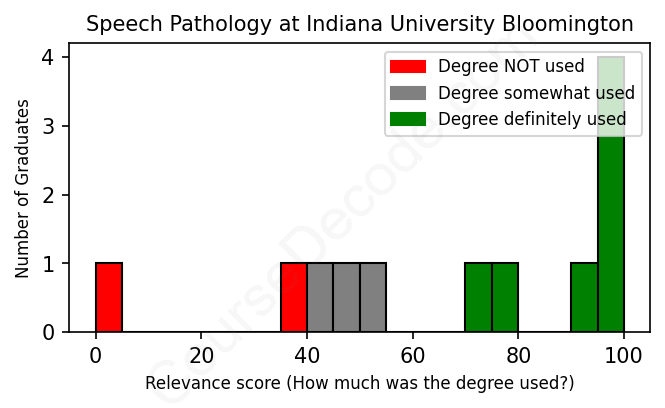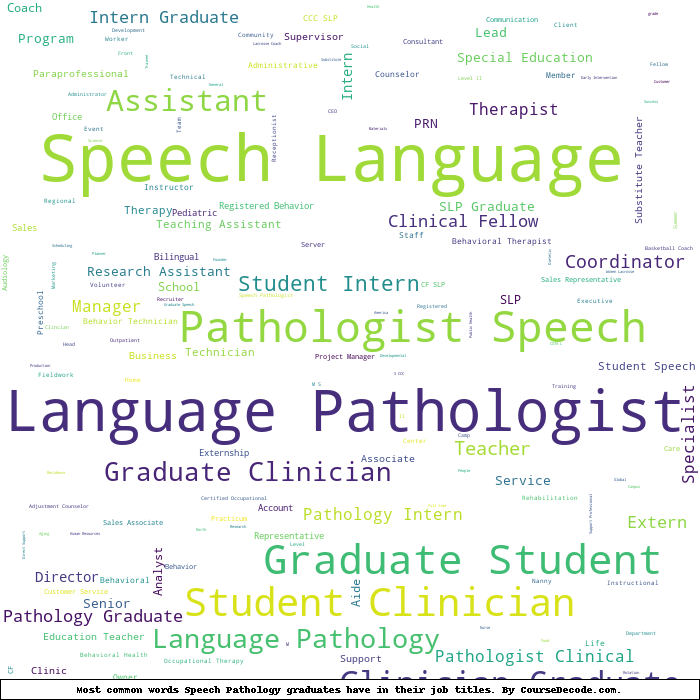
First, some facts. Of the Speech Pathology graduates from Indiana University Bloomington we've analyzed , here's how many have used (or NOT used) their degree in their career:

These are estimates based on AI analysis of 12 LinkedIn profiles (see below).
The verdict? Slightly above average. Overall, with an average relevance score of 68%, Speech Pathology graduates from Indiana University Bloomington have a slightly higher likelihood (+1%) of finding work in this field compared to the average graduate across all fields:
And for comparison, here's the chart for all profiles we've looked at across all degrees.
Also, after graduating, 75% of these graduates have pursued further education other than another Bachelor's degree (such as a Masters degree or other), compared to the average across all profiles of 35%. This suggests you may need more than just a Bachelors degree to be competitive as a Speech Pathology graduate.
See the details:
|
Relevance score: 74% We think this person has gone into a career highly relevant to their degree. We think this person has gone into a career highly relevant to their degree.
DEGREE INFOGraduated in 2019 from Indiana University Bloomington with a Bachelors Degree in Speech Pathology. Also pursued further education since (see below). JOB HISTORY SINCE GRADUATIONRegistered Behavioral Technician Hopebridge May 2019 - Aug 2019 Graduate Assistant  Ohio University School of Nursing Aug 2019 - Present Speech Pathology Graduate Clinician  Ohio University Aug 2019 - Present FURTHER DEGREES DONE SINCE GRADUATINGMaster of Arts - MAOhio University 2019 - 2021 ABOUTNo information provided. |
The top 10 most common jobs done by the graduates we've analyzed (ranked most common to least) are:
When looking at the job trajectories of Indiana University Bloomington graduates with a degree in Speech Pathology, a significant trend emerges. Many of them have secured roles as Speech Language Pathologists or within clinical settings directly related to speech therapy. These positions usually require the specific skills and knowledge that come from their Speech Pathology education, allowing them to work effectively with clients who have communication disorders. Notably, graduates from 2014 onward seem to find solid footing in roles that utilize their degree, such as therapists in educational and medical institutions. However, not all graduates have followed this path.
On the flip side, there are several individuals who have ventured into roles where their Speech Pathology background may not be as relevant. Jobs in sales, production, or even teaching subjects unrelated to communication highlight a significant departure from their training. It’s interesting to see how diverse the paths can be, with some graduates finding ways to incorporate their skills indirectly, like in childcare or special education roles. Overall, while there’s a healthy proportion of graduates leveraging their Speech Pathology education directly in clinical roles, a fair number also seem to stray into completely unrelated fields. This suggests that while the degree offers strong opportunities in therapy settings, there’s flexibility to pursue various career paths based on personal interests and opportunities that arise post-graduation.
Here is a visual representation of the most common words in job titles for Speech Pathology graduates (this is across all Speech Pathology graduates we've analyzed, not just those who went to Indiana University Bloomington):

When looking at the career trajectories of Speech Pathology graduates from Indiana University Bloomington, there's a clear trend that emerges. Right out of college, many graduates find their footing in related roles like speech-language pathologists and therapists, especially within educational settings or healthcare facilities. The first job after graduation often seems to center around foundational positions in clinical settings, providing hands-on experience that is crucial for building a career in speech pathology. However, there are also instances where graduates initially take on unrelated jobs, such as sales or roles in daycare, which could indicate a search for stability or a temporary detour before diving into their field.
Fast forward five to ten years later, and it looks like many of these graduates do end up in more relevant positions, with several successfully establishing roles as speech-language pathologists in various organizations and schools. They seem to have made a strong transition into solid careers directly related to their degree, especially those who started in the field shortly after graduation. While there are some who take alternative paths away from traditional clinical roles, a significant number do return to education and therapy settings, highlighting the value of their degree in securing fulfilling careers in speech pathology. Overall, it seems like Indiana University Bloomington graduates are navigating a journey that often leads them back to their roots in speech therapy, putting their education to good use in the long run!
So, here's the deal with a Bachelor's degree in Speech Pathology at Indiana University Bloomington—it's pretty challenging but manageable if you stay on top of things. You'll dive into some tough coursework related to communication sciences and disorders, anatomy, and human development, which can get pretty intense. There’s also a lot of hands-on experience and practical work involved, so you won’t just be hitting the books. While it's definitely not a walk in the park, it's not the hardest degree out there either; if you’re passionate about the subject and willing to put in the effort, you can definitely make it through without too much stress!
Most commonly, in the LinkedIn profiles we've looked at, it takes people 4 years to finish a Bachelor degree in Speech Pathology.
From what I can see in these profiles, it looks like some of the Speech Pathology grads from Indiana University Bloomington are managing to snag decent jobs, while others are still working their way up. The ones who got into speech language pathology right away, like those working in schools or hospitals, are probably making pretty good money, given that field pays well, especially with experience. On the flip side, some of the earlier jobs listed, like working as a behavior therapist or with kids in daycare, tend to have lower pay. But hey, a lot of them have gradually stepped up into roles with better financial prospects, especially those in healthcare. Overall, it seems like those going for established speech pathology roles have solid earning potential; they just have to play the long game a bit after starting out!
Here is a visual representation of the most common words seen in the "about" section of LinkedIn profiles who have a Bachelor degree in Speech Pathology (this is across all Speech Pathology graduates we've analyzed, not just those who went to Indiana University Bloomington). This may or may not be useful:

Here are all colleges offering a Bachelor degree in Speech Pathology (ordered by the average relevance score of their Speech Pathology graduates, best to worst) where we have analyzed at least 10 of their graduates:
| College | Score | Count |
|---|---|---|
 Indiana University Bloomington Indiana University Bloomington
|
68 | 12 |